Why Managers Should Prioritize Effective Communication in Workplace?
VerifiedAdded on 2023/06/11
|10
|2023
|72
Report
AI Summary
This report investigates the importance of effective communication in the workplace, focusing on why managers should prioritize it. It examines organizational communication, highlighting the significance of exchanging ideas and information to foster a positive environment. The report explores formal and informal communication channels, including downward, upward, and horizontal communication, and discusses strategies for improving communication at different levels within an organization. It emphasizes the role of communication in achieving organizational goals, building trust, and reducing uncertainty, while also addressing common communication issues that can hinder teamwork and productivity. The report concludes that effective communication is crucial for organizational success, enabling employees to engage in their roles, share ideas, and contribute to the company's overall objectives.
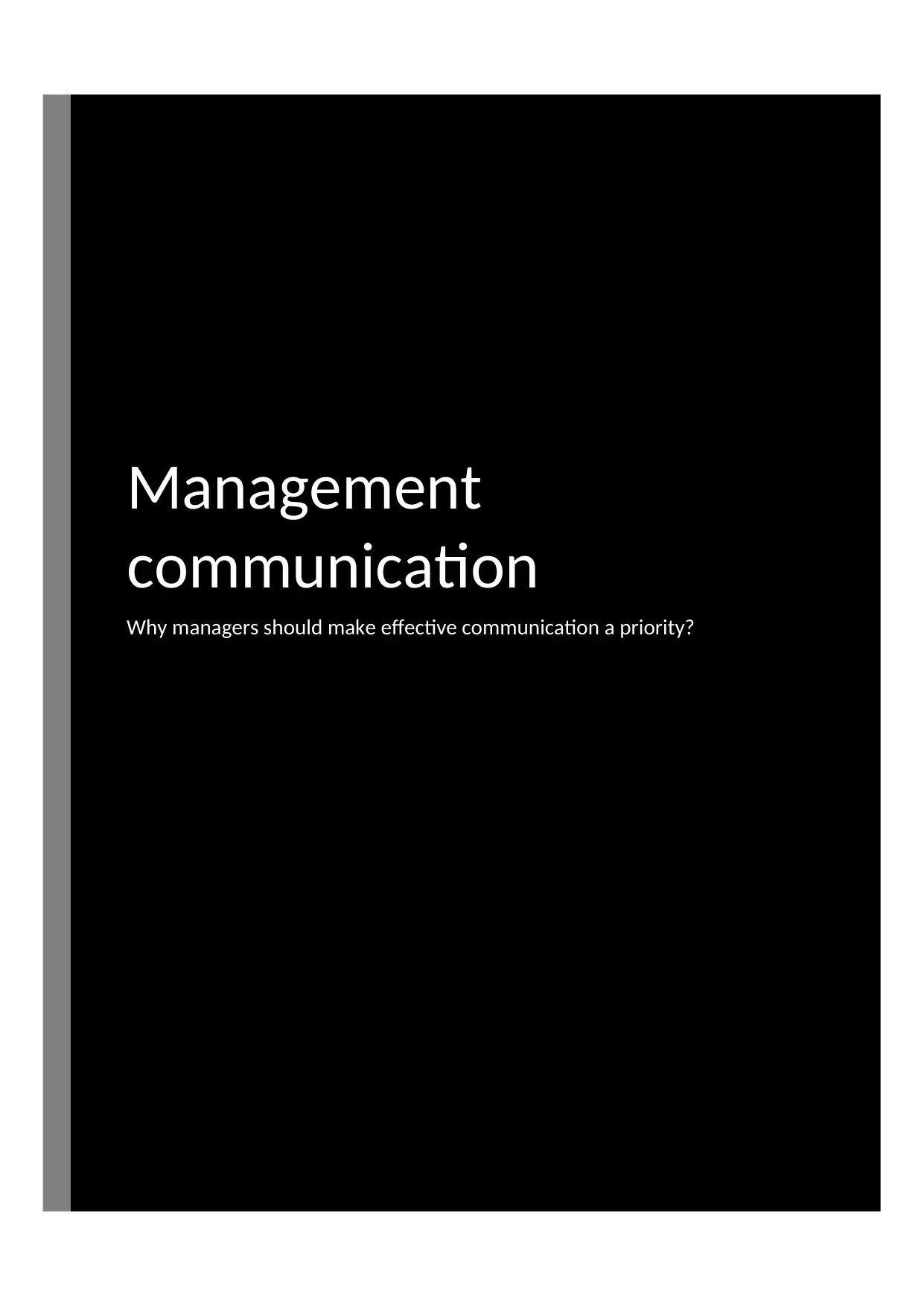
Management
communication
Why managers should make effective communication a priority?
communication
Why managers should make effective communication a priority?
Paraphrase This Document
Need a fresh take? Get an instant paraphrase of this document with our AI Paraphraser

1
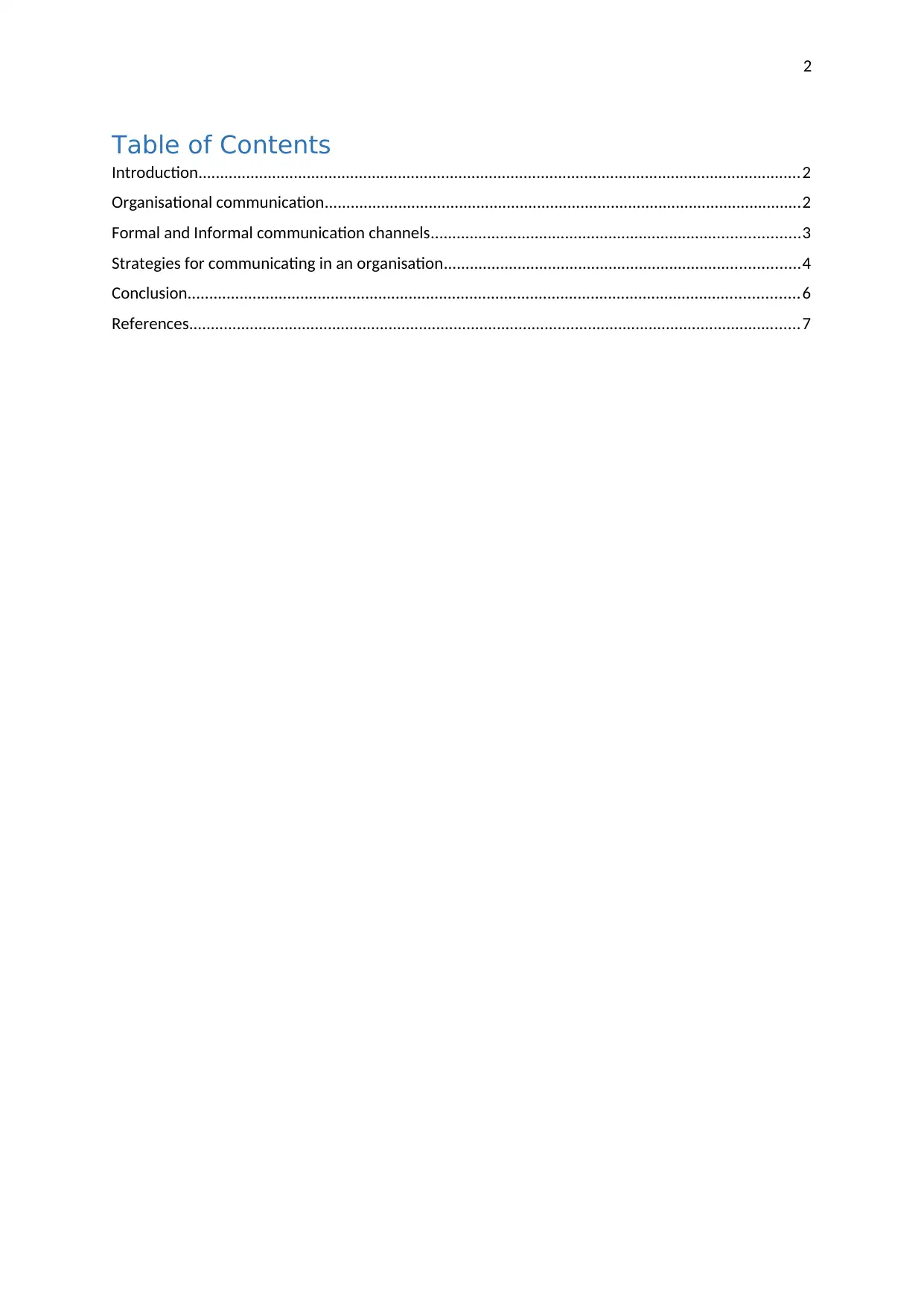
2
Table of Contents
Introduction...........................................................................................................................................2
Organisational communication..............................................................................................................2
Formal and Informal communication channels.....................................................................................3
Strategies for communicating in an organisation..................................................................................4
Conclusion.............................................................................................................................................6
References.............................................................................................................................................7
Table of Contents
Introduction...........................................................................................................................................2
Organisational communication..............................................................................................................2
Formal and Informal communication channels.....................................................................................3
Strategies for communicating in an organisation..................................................................................4
Conclusion.............................................................................................................................................6
References.............................................................................................................................................7
⊘ This is a preview!⊘
Do you want full access?
Subscribe today to unlock all pages.

Trusted by 1+ million students worldwide
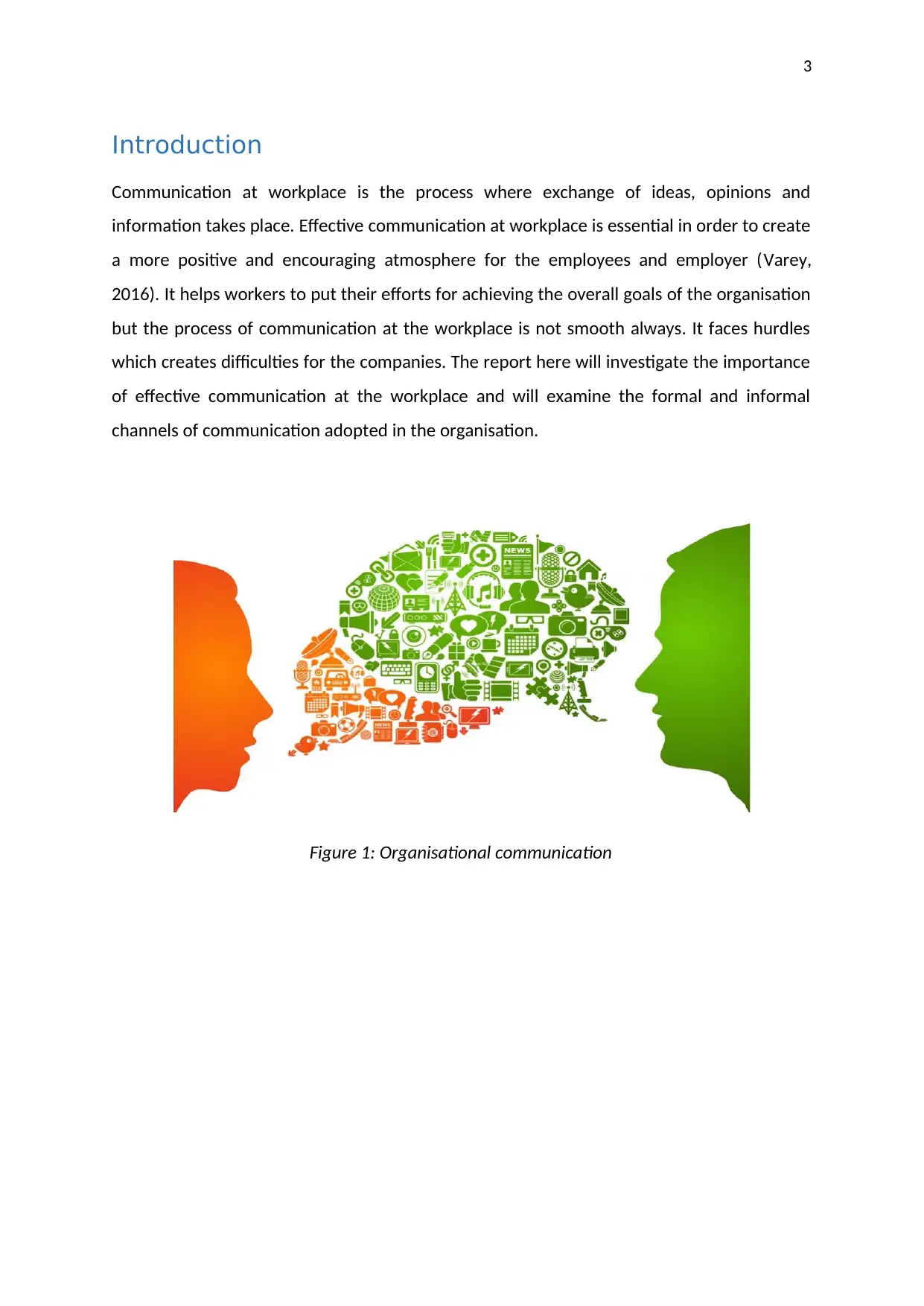
3
Introduction
Communication at workplace is the process where exchange of ideas, opinions and
information takes place. Effective communication at workplace is essential in order to create
a more positive and encouraging atmosphere for the employees and employer (Varey,
2016). It helps workers to put their efforts for achieving the overall goals of the organisation
but the process of communication at the workplace is not smooth always. It faces hurdles
which creates difficulties for the companies. The report here will investigate the importance
of effective communication at the workplace and will examine the formal and informal
channels of communication adopted in the organisation.
Figure 1: Organisational communication
Introduction
Communication at workplace is the process where exchange of ideas, opinions and
information takes place. Effective communication at workplace is essential in order to create
a more positive and encouraging atmosphere for the employees and employer (Varey,
2016). It helps workers to put their efforts for achieving the overall goals of the organisation
but the process of communication at the workplace is not smooth always. It faces hurdles
which creates difficulties for the companies. The report here will investigate the importance
of effective communication at the workplace and will examine the formal and informal
channels of communication adopted in the organisation.
Figure 1: Organisational communication
Paraphrase This Document
Need a fresh take? Get an instant paraphrase of this document with our AI Paraphraser
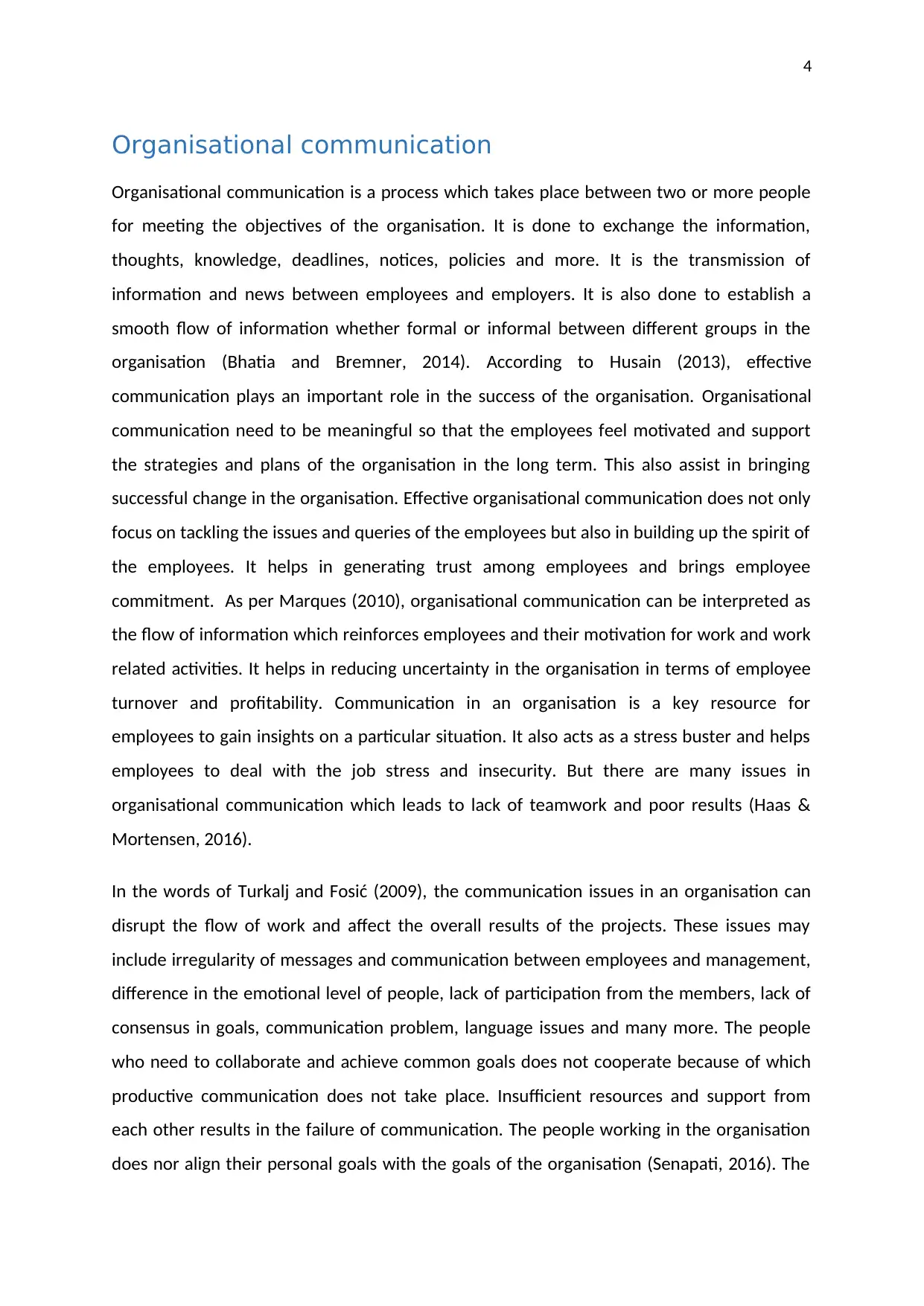
4
Organisational communication
Organisational communication is a process which takes place between two or more people
for meeting the objectives of the organisation. It is done to exchange the information,
thoughts, knowledge, deadlines, notices, policies and more. It is the transmission of
information and news between employees and employers. It is also done to establish a
smooth flow of information whether formal or informal between different groups in the
organisation (Bhatia and Bremner, 2014). According to Husain (2013), effective
communication plays an important role in the success of the organisation. Organisational
communication need to be meaningful so that the employees feel motivated and support
the strategies and plans of the organisation in the long term. This also assist in bringing
successful change in the organisation. Effective organisational communication does not only
focus on tackling the issues and queries of the employees but also in building up the spirit of
the employees. It helps in generating trust among employees and brings employee
commitment. As per Marques (2010), organisational communication can be interpreted as
the flow of information which reinforces employees and their motivation for work and work
related activities. It helps in reducing uncertainty in the organisation in terms of employee
turnover and profitability. Communication in an organisation is a key resource for
employees to gain insights on a particular situation. It also acts as a stress buster and helps
employees to deal with the job stress and insecurity. But there are many issues in
organisational communication which leads to lack of teamwork and poor results (Haas &
Mortensen, 2016).
In the words of Turkalj and Fosić (2009), the communication issues in an organisation can
disrupt the flow of work and affect the overall results of the projects. These issues may
include irregularity of messages and communication between employees and management,
difference in the emotional level of people, lack of participation from the members, lack of
consensus in goals, communication problem, language issues and many more. The people
who need to collaborate and achieve common goals does not cooperate because of which
productive communication does not take place. Insufficient resources and support from
each other results in the failure of communication. The people working in the organisation
does nor align their personal goals with the goals of the organisation (Senapati, 2016). The
Organisational communication
Organisational communication is a process which takes place between two or more people
for meeting the objectives of the organisation. It is done to exchange the information,
thoughts, knowledge, deadlines, notices, policies and more. It is the transmission of
information and news between employees and employers. It is also done to establish a
smooth flow of information whether formal or informal between different groups in the
organisation (Bhatia and Bremner, 2014). According to Husain (2013), effective
communication plays an important role in the success of the organisation. Organisational
communication need to be meaningful so that the employees feel motivated and support
the strategies and plans of the organisation in the long term. This also assist in bringing
successful change in the organisation. Effective organisational communication does not only
focus on tackling the issues and queries of the employees but also in building up the spirit of
the employees. It helps in generating trust among employees and brings employee
commitment. As per Marques (2010), organisational communication can be interpreted as
the flow of information which reinforces employees and their motivation for work and work
related activities. It helps in reducing uncertainty in the organisation in terms of employee
turnover and profitability. Communication in an organisation is a key resource for
employees to gain insights on a particular situation. It also acts as a stress buster and helps
employees to deal with the job stress and insecurity. But there are many issues in
organisational communication which leads to lack of teamwork and poor results (Haas &
Mortensen, 2016).
In the words of Turkalj and Fosić (2009), the communication issues in an organisation can
disrupt the flow of work and affect the overall results of the projects. These issues may
include irregularity of messages and communication between employees and management,
difference in the emotional level of people, lack of participation from the members, lack of
consensus in goals, communication problem, language issues and many more. The people
who need to collaborate and achieve common goals does not cooperate because of which
productive communication does not take place. Insufficient resources and support from
each other results in the failure of communication. The people working in the organisation
does nor align their personal goals with the goals of the organisation (Senapati, 2016). The
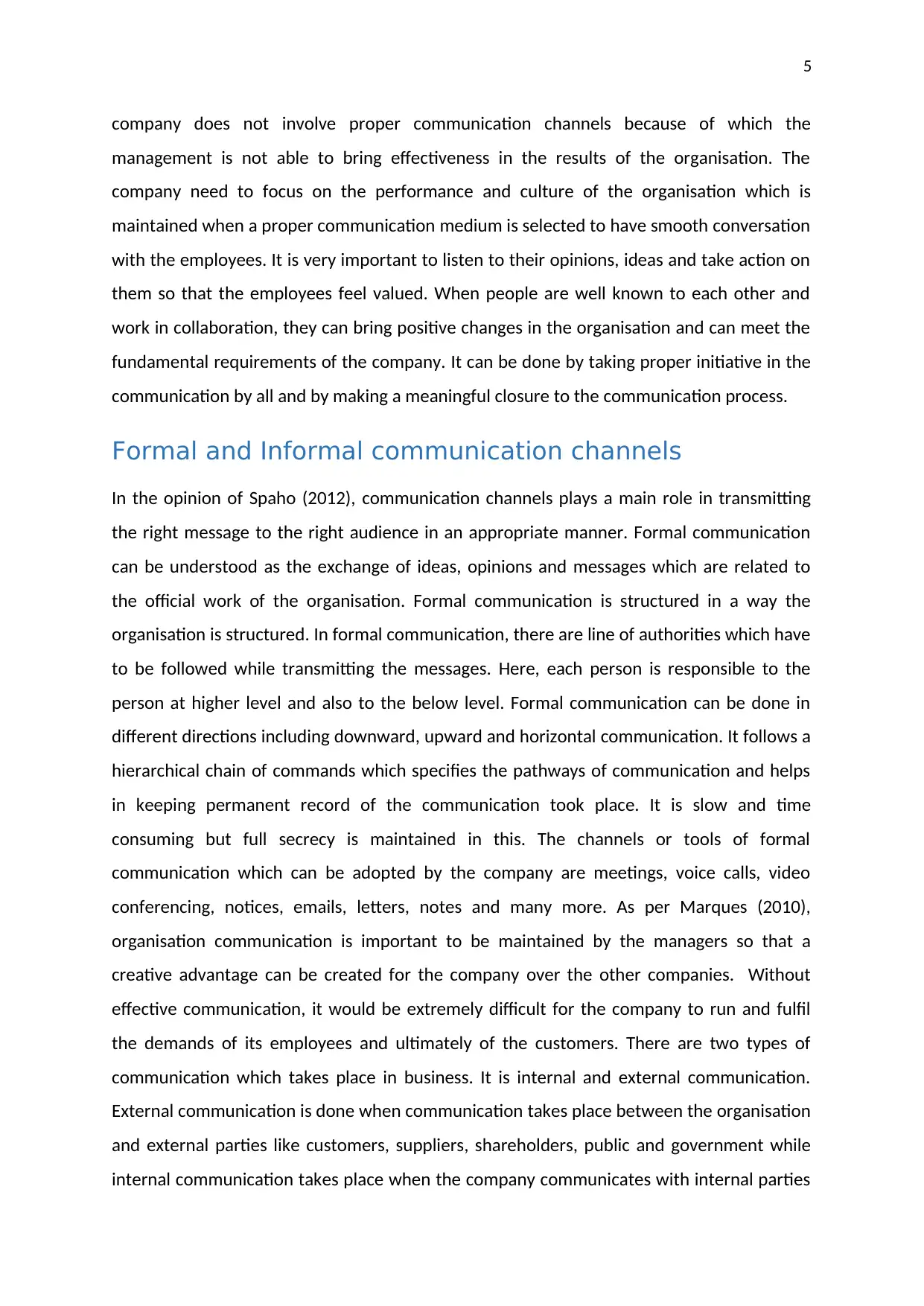
5
company does not involve proper communication channels because of which the
management is not able to bring effectiveness in the results of the organisation. The
company need to focus on the performance and culture of the organisation which is
maintained when a proper communication medium is selected to have smooth conversation
with the employees. It is very important to listen to their opinions, ideas and take action on
them so that the employees feel valued. When people are well known to each other and
work in collaboration, they can bring positive changes in the organisation and can meet the
fundamental requirements of the company. It can be done by taking proper initiative in the
communication by all and by making a meaningful closure to the communication process.
Formal and Informal communication channels
In the opinion of Spaho (2012), communication channels plays a main role in transmitting
the right message to the right audience in an appropriate manner. Formal communication
can be understood as the exchange of ideas, opinions and messages which are related to
the official work of the organisation. Formal communication is structured in a way the
organisation is structured. In formal communication, there are line of authorities which have
to be followed while transmitting the messages. Here, each person is responsible to the
person at higher level and also to the below level. Formal communication can be done in
different directions including downward, upward and horizontal communication. It follows a
hierarchical chain of commands which specifies the pathways of communication and helps
in keeping permanent record of the communication took place. It is slow and time
consuming but full secrecy is maintained in this. The channels or tools of formal
communication which can be adopted by the company are meetings, voice calls, video
conferencing, notices, emails, letters, notes and many more. As per Marques (2010),
organisation communication is important to be maintained by the managers so that a
creative advantage can be created for the company over the other companies. Without
effective communication, it would be extremely difficult for the company to run and fulfil
the demands of its employees and ultimately of the customers. There are two types of
communication which takes place in business. It is internal and external communication.
External communication is done when communication takes place between the organisation
and external parties like customers, suppliers, shareholders, public and government while
internal communication takes place when the company communicates with internal parties
company does not involve proper communication channels because of which the
management is not able to bring effectiveness in the results of the organisation. The
company need to focus on the performance and culture of the organisation which is
maintained when a proper communication medium is selected to have smooth conversation
with the employees. It is very important to listen to their opinions, ideas and take action on
them so that the employees feel valued. When people are well known to each other and
work in collaboration, they can bring positive changes in the organisation and can meet the
fundamental requirements of the company. It can be done by taking proper initiative in the
communication by all and by making a meaningful closure to the communication process.
Formal and Informal communication channels
In the opinion of Spaho (2012), communication channels plays a main role in transmitting
the right message to the right audience in an appropriate manner. Formal communication
can be understood as the exchange of ideas, opinions and messages which are related to
the official work of the organisation. Formal communication is structured in a way the
organisation is structured. In formal communication, there are line of authorities which have
to be followed while transmitting the messages. Here, each person is responsible to the
person at higher level and also to the below level. Formal communication can be done in
different directions including downward, upward and horizontal communication. It follows a
hierarchical chain of commands which specifies the pathways of communication and helps
in keeping permanent record of the communication took place. It is slow and time
consuming but full secrecy is maintained in this. The channels or tools of formal
communication which can be adopted by the company are meetings, voice calls, video
conferencing, notices, emails, letters, notes and many more. As per Marques (2010),
organisation communication is important to be maintained by the managers so that a
creative advantage can be created for the company over the other companies. Without
effective communication, it would be extremely difficult for the company to run and fulfil
the demands of its employees and ultimately of the customers. There are two types of
communication which takes place in business. It is internal and external communication.
External communication is done when communication takes place between the organisation
and external parties like customers, suppliers, shareholders, public and government while
internal communication takes place when the company communicates with internal parties
⊘ This is a preview!⊘
Do you want full access?
Subscribe today to unlock all pages.

Trusted by 1+ million students worldwide
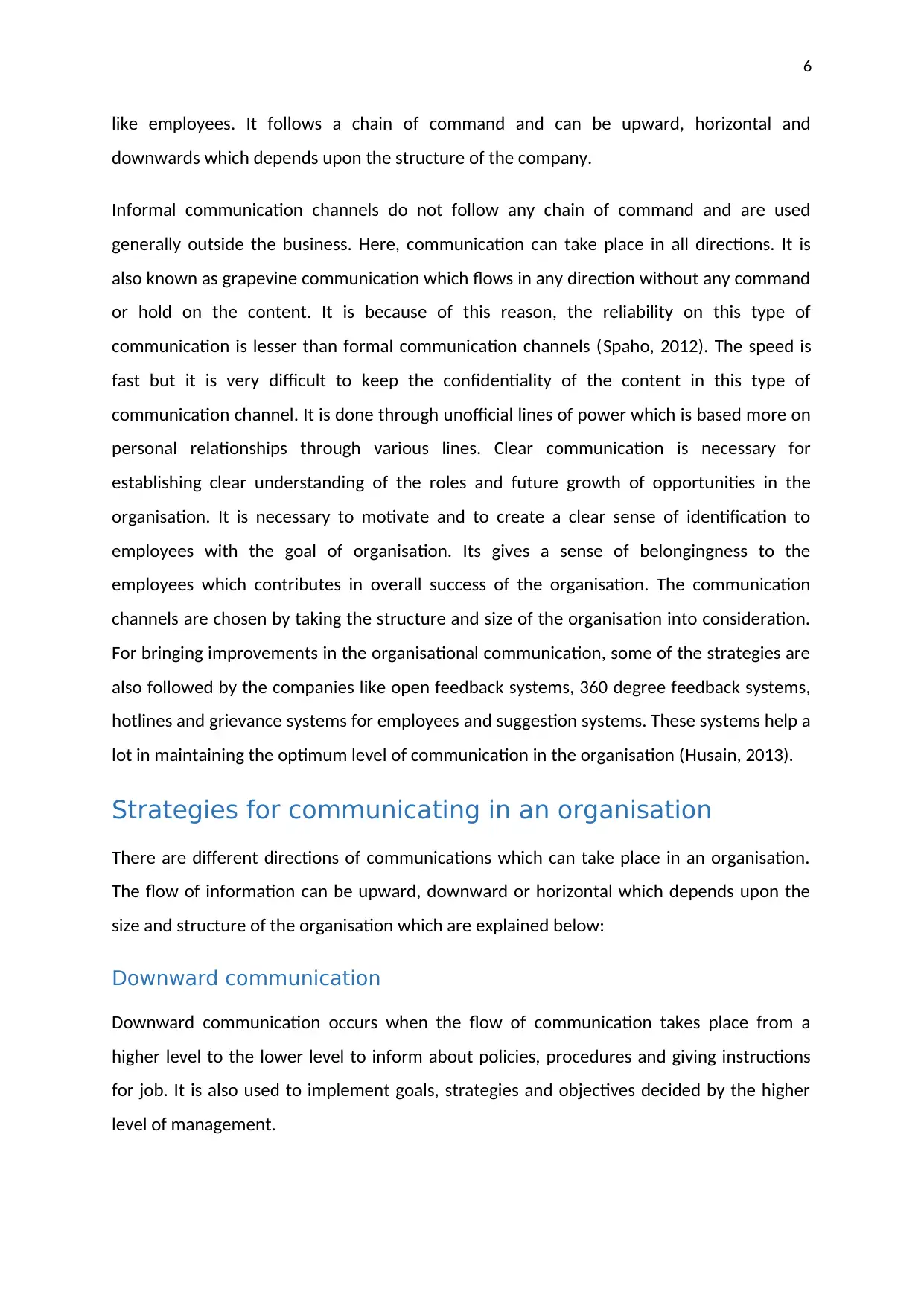
6
like employees. It follows a chain of command and can be upward, horizontal and
downwards which depends upon the structure of the company.
Informal communication channels do not follow any chain of command and are used
generally outside the business. Here, communication can take place in all directions. It is
also known as grapevine communication which flows in any direction without any command
or hold on the content. It is because of this reason, the reliability on this type of
communication is lesser than formal communication channels (Spaho, 2012). The speed is
fast but it is very difficult to keep the confidentiality of the content in this type of
communication channel. It is done through unofficial lines of power which is based more on
personal relationships through various lines. Clear communication is necessary for
establishing clear understanding of the roles and future growth of opportunities in the
organisation. It is necessary to motivate and to create a clear sense of identification to
employees with the goal of organisation. Its gives a sense of belongingness to the
employees which contributes in overall success of the organisation. The communication
channels are chosen by taking the structure and size of the organisation into consideration.
For bringing improvements in the organisational communication, some of the strategies are
also followed by the companies like open feedback systems, 360 degree feedback systems,
hotlines and grievance systems for employees and suggestion systems. These systems help a
lot in maintaining the optimum level of communication in the organisation (Husain, 2013).
Strategies for communicating in an organisation
There are different directions of communications which can take place in an organisation.
The flow of information can be upward, downward or horizontal which depends upon the
size and structure of the organisation which are explained below:
Downward communication
Downward communication occurs when the flow of communication takes place from a
higher level to the lower level to inform about policies, procedures and giving instructions
for job. It is also used to implement goals, strategies and objectives decided by the higher
level of management.
like employees. It follows a chain of command and can be upward, horizontal and
downwards which depends upon the structure of the company.
Informal communication channels do not follow any chain of command and are used
generally outside the business. Here, communication can take place in all directions. It is
also known as grapevine communication which flows in any direction without any command
or hold on the content. It is because of this reason, the reliability on this type of
communication is lesser than formal communication channels (Spaho, 2012). The speed is
fast but it is very difficult to keep the confidentiality of the content in this type of
communication channel. It is done through unofficial lines of power which is based more on
personal relationships through various lines. Clear communication is necessary for
establishing clear understanding of the roles and future growth of opportunities in the
organisation. It is necessary to motivate and to create a clear sense of identification to
employees with the goal of organisation. Its gives a sense of belongingness to the
employees which contributes in overall success of the organisation. The communication
channels are chosen by taking the structure and size of the organisation into consideration.
For bringing improvements in the organisational communication, some of the strategies are
also followed by the companies like open feedback systems, 360 degree feedback systems,
hotlines and grievance systems for employees and suggestion systems. These systems help a
lot in maintaining the optimum level of communication in the organisation (Husain, 2013).
Strategies for communicating in an organisation
There are different directions of communications which can take place in an organisation.
The flow of information can be upward, downward or horizontal which depends upon the
size and structure of the organisation which are explained below:
Downward communication
Downward communication occurs when the flow of communication takes place from a
higher level to the lower level to inform about policies, procedures and giving instructions
for job. It is also used to implement goals, strategies and objectives decided by the higher
level of management.
Paraphrase This Document
Need a fresh take? Get an instant paraphrase of this document with our AI Paraphraser
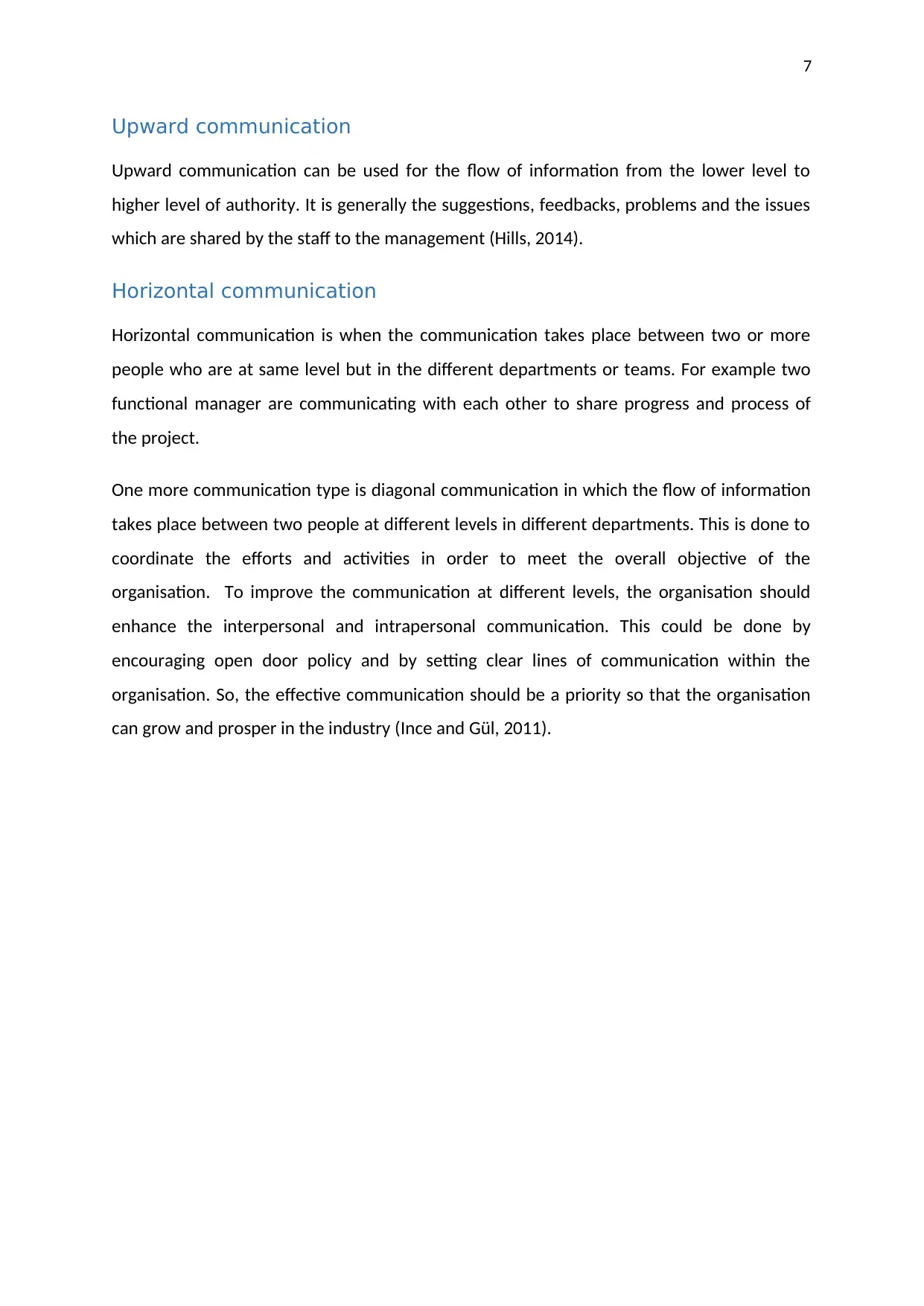
7
Upward communication
Upward communication can be used for the flow of information from the lower level to
higher level of authority. It is generally the suggestions, feedbacks, problems and the issues
which are shared by the staff to the management (Hills, 2014).
Horizontal communication
Horizontal communication is when the communication takes place between two or more
people who are at same level but in the different departments or teams. For example two
functional manager are communicating with each other to share progress and process of
the project.
One more communication type is diagonal communication in which the flow of information
takes place between two people at different levels in different departments. This is done to
coordinate the efforts and activities in order to meet the overall objective of the
organisation. To improve the communication at different levels, the organisation should
enhance the interpersonal and intrapersonal communication. This could be done by
encouraging open door policy and by setting clear lines of communication within the
organisation. So, the effective communication should be a priority so that the organisation
can grow and prosper in the industry (Ince and Gül, 2011).
Upward communication
Upward communication can be used for the flow of information from the lower level to
higher level of authority. It is generally the suggestions, feedbacks, problems and the issues
which are shared by the staff to the management (Hills, 2014).
Horizontal communication
Horizontal communication is when the communication takes place between two or more
people who are at same level but in the different departments or teams. For example two
functional manager are communicating with each other to share progress and process of
the project.
One more communication type is diagonal communication in which the flow of information
takes place between two people at different levels in different departments. This is done to
coordinate the efforts and activities in order to meet the overall objective of the
organisation. To improve the communication at different levels, the organisation should
enhance the interpersonal and intrapersonal communication. This could be done by
encouraging open door policy and by setting clear lines of communication within the
organisation. So, the effective communication should be a priority so that the organisation
can grow and prosper in the industry (Ince and Gül, 2011).
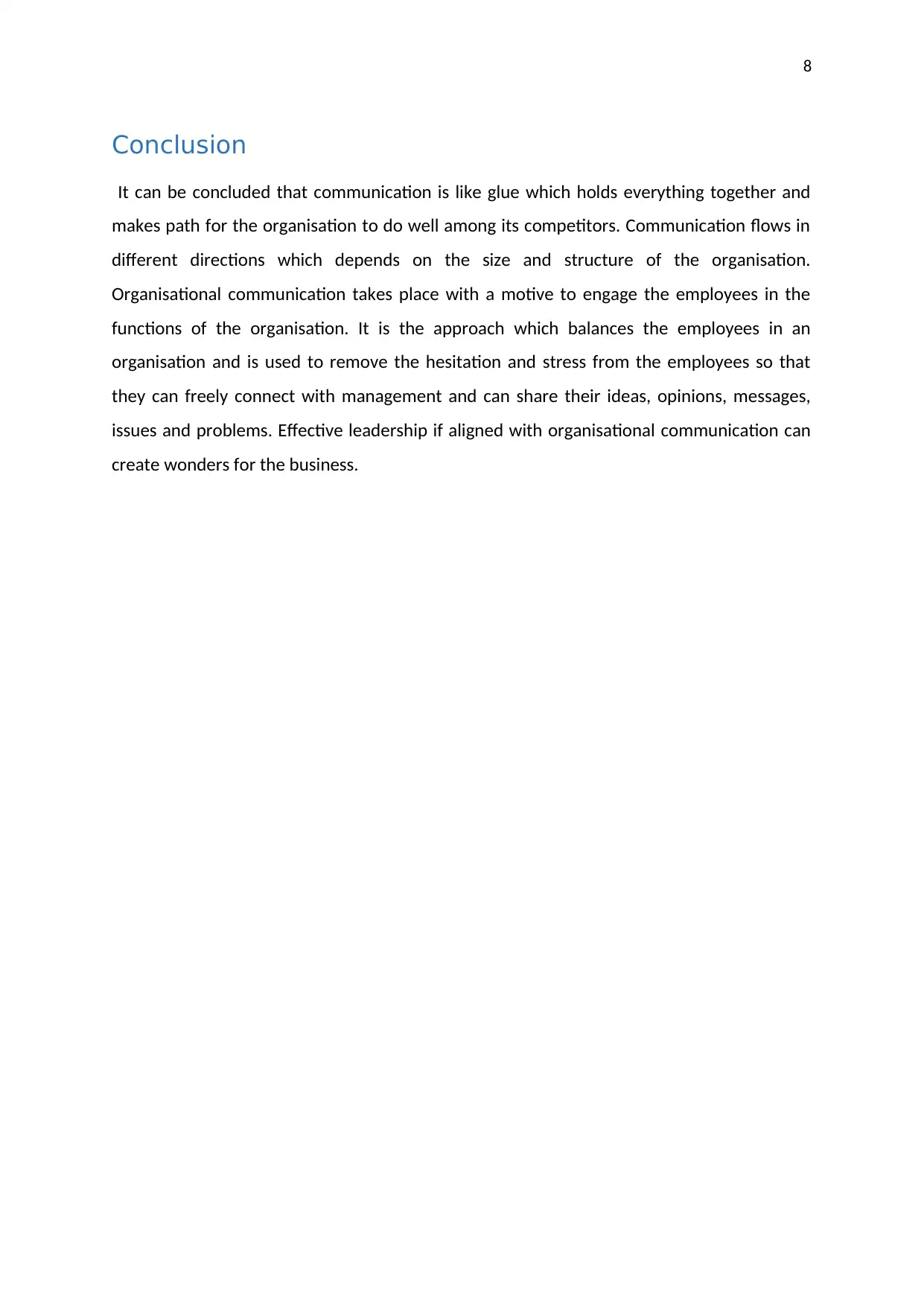
8
Conclusion
It can be concluded that communication is like glue which holds everything together and
makes path for the organisation to do well among its competitors. Communication flows in
different directions which depends on the size and structure of the organisation.
Organisational communication takes place with a motive to engage the employees in the
functions of the organisation. It is the approach which balances the employees in an
organisation and is used to remove the hesitation and stress from the employees so that
they can freely connect with management and can share their ideas, opinions, messages,
issues and problems. Effective leadership if aligned with organisational communication can
create wonders for the business.
Conclusion
It can be concluded that communication is like glue which holds everything together and
makes path for the organisation to do well among its competitors. Communication flows in
different directions which depends on the size and structure of the organisation.
Organisational communication takes place with a motive to engage the employees in the
functions of the organisation. It is the approach which balances the employees in an
organisation and is used to remove the hesitation and stress from the employees so that
they can freely connect with management and can share their ideas, opinions, messages,
issues and problems. Effective leadership if aligned with organisational communication can
create wonders for the business.
⊘ This is a preview!⊘
Do you want full access?
Subscribe today to unlock all pages.

Trusted by 1+ million students worldwide
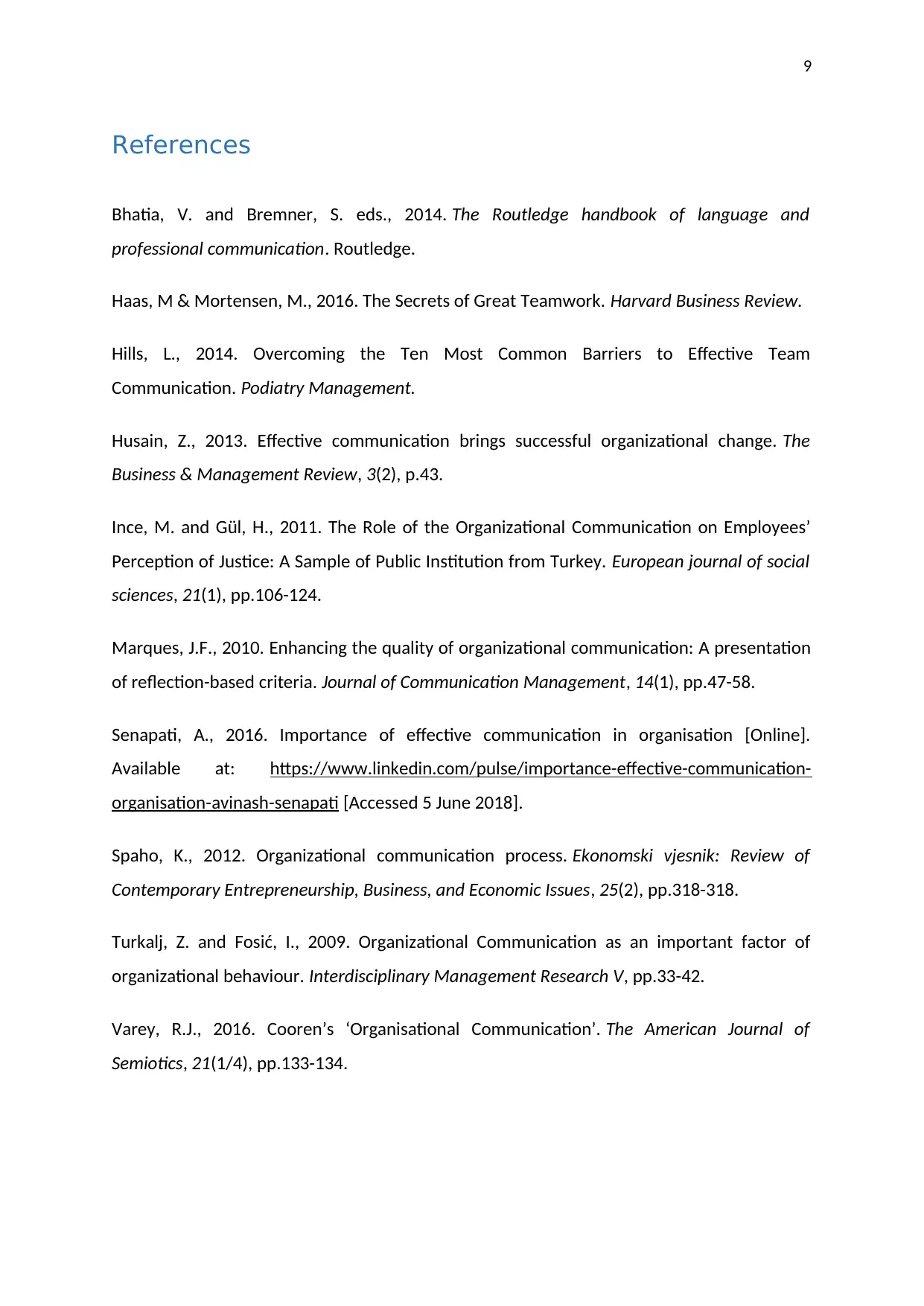
9
References
Bhatia, V. and Bremner, S. eds., 2014. The Routledge handbook of language and
professional communication. Routledge.
Haas, M & Mortensen, M., 2016. The Secrets of Great Teamwork. Harvard Business Review.
Hills, L., 2014. Overcoming the Ten Most Common Barriers to Effective Team
Communication. Podiatry Management.
Husain, Z., 2013. Effective communication brings successful organizational change. The
Business & Management Review, 3(2), p.43.
Ince, M. and Gül, H., 2011. The Role of the Organizational Communication on Employees’
Perception of Justice: A Sample of Public Institution from Turkey. European journal of social
sciences, 21(1), pp.106-124.
Marques, J.F., 2010. Enhancing the quality of organizational communication: A presentation
of reflection-based criteria. Journal of Communication Management, 14(1), pp.47-58.
Senapati, A., 2016. Importance of effective communication in organisation [Online].
Available at: https://www.linkedin.com/pulse/importance-effective-communication-
organisation-avinash-senapati [Accessed 5 June 2018].
Spaho, K., 2012. Organizational communication process. Ekonomski vjesnik: Review of
Contemporary Entrepreneurship, Business, and Economic Issues, 25(2), pp.318-318.
Turkalj, Z. and Fosić, I., 2009. Organizational Communication as an important factor of
organizational behaviour. Interdisciplinary Management Research V, pp.33-42.
Varey, R.J., 2016. Cooren’s ‘Organisational Communication’. The American Journal of
Semiotics, 21(1/4), pp.133-134.
References
Bhatia, V. and Bremner, S. eds., 2014. The Routledge handbook of language and
professional communication. Routledge.
Haas, M & Mortensen, M., 2016. The Secrets of Great Teamwork. Harvard Business Review.
Hills, L., 2014. Overcoming the Ten Most Common Barriers to Effective Team
Communication. Podiatry Management.
Husain, Z., 2013. Effective communication brings successful organizational change. The
Business & Management Review, 3(2), p.43.
Ince, M. and Gül, H., 2011. The Role of the Organizational Communication on Employees’
Perception of Justice: A Sample of Public Institution from Turkey. European journal of social
sciences, 21(1), pp.106-124.
Marques, J.F., 2010. Enhancing the quality of organizational communication: A presentation
of reflection-based criteria. Journal of Communication Management, 14(1), pp.47-58.
Senapati, A., 2016. Importance of effective communication in organisation [Online].
Available at: https://www.linkedin.com/pulse/importance-effective-communication-
organisation-avinash-senapati [Accessed 5 June 2018].
Spaho, K., 2012. Organizational communication process. Ekonomski vjesnik: Review of
Contemporary Entrepreneurship, Business, and Economic Issues, 25(2), pp.318-318.
Turkalj, Z. and Fosić, I., 2009. Organizational Communication as an important factor of
organizational behaviour. Interdisciplinary Management Research V, pp.33-42.
Varey, R.J., 2016. Cooren’s ‘Organisational Communication’. The American Journal of
Semiotics, 21(1/4), pp.133-134.
1 out of 10
Related Documents
Your All-in-One AI-Powered Toolkit for Academic Success.
+13062052269
info@desklib.com
Available 24*7 on WhatsApp / Email
![[object Object]](/_next/static/media/star-bottom.7253800d.svg)
Unlock your academic potential
Copyright © 2020–2026 A2Z Services. All Rights Reserved. Developed and managed by ZUCOL.





